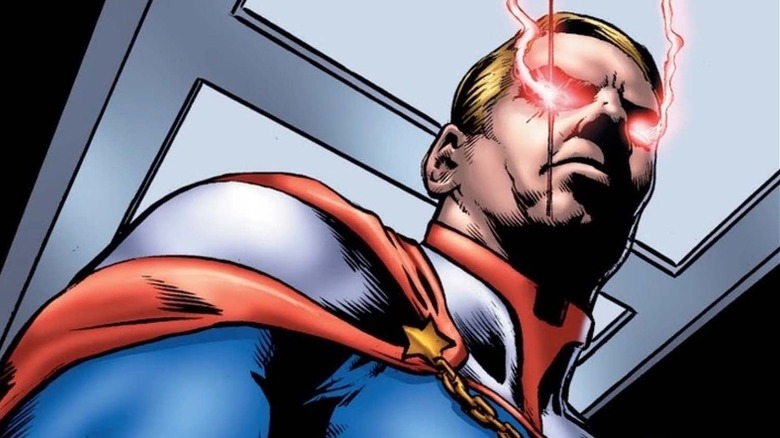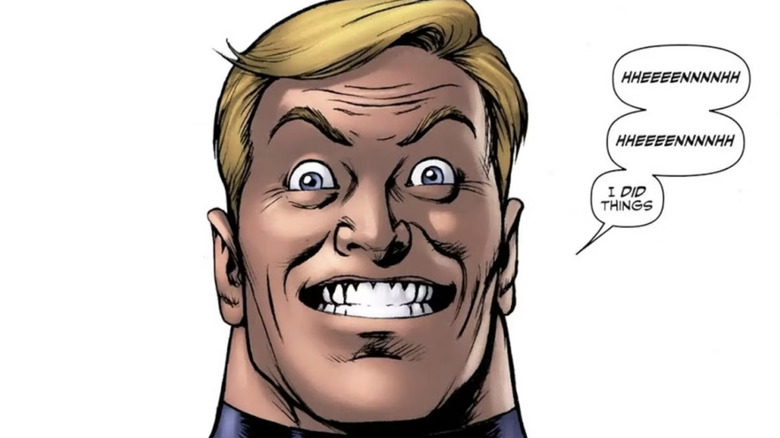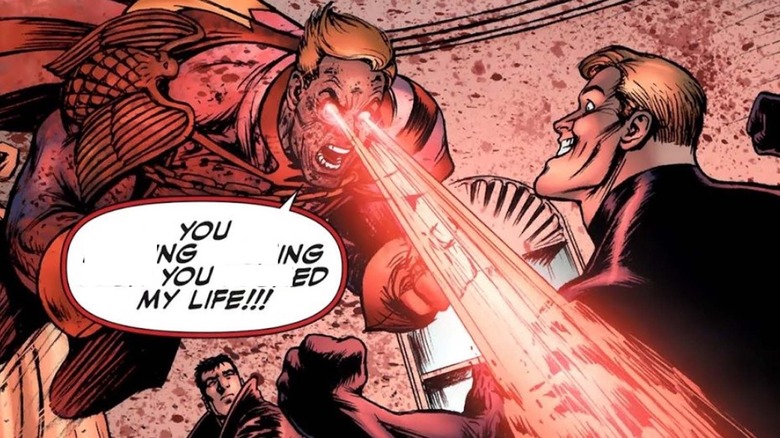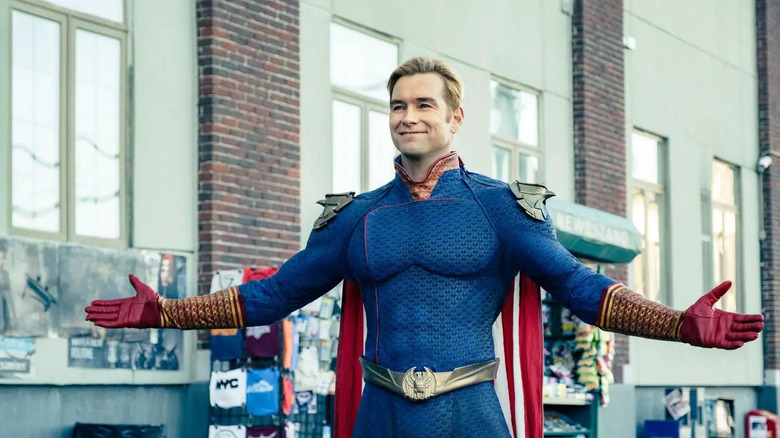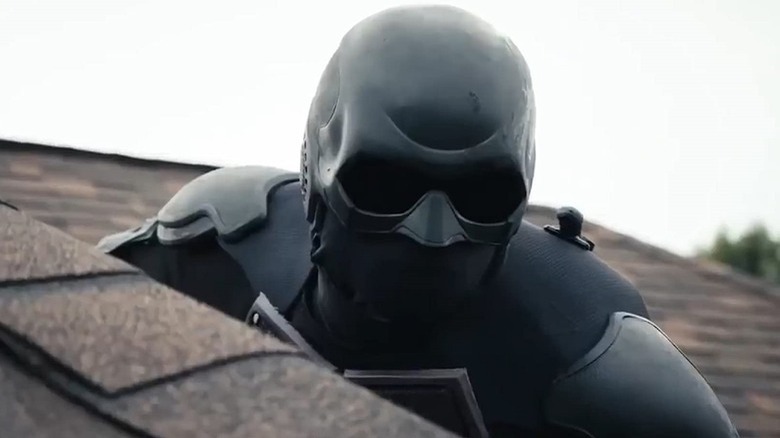The Boys: Does Homelander Survive The Comic Book Series?
In both "The Boys" comics and live-action series, Homelander earns his title as one of the world's most terrifyingly powerful Supes. His blend of arrogance, insecurity, and selfishness, combined with his Superman-like abilities, make him a deadly force that few other heroes rival in terms of pure power. However, while he might seem unable to be defeated or killed, Homelander actually doesn't make it to the end of "The Boys" comic, instead suffering a gruesome death at the hands of a character specifically created to take him down.
But what does it take to kill Homelander, and could the comic's storyline be adapted for the live-action series? The answer is ... complicated. While it's possible Prime Video's "The Boys" could follow the events of the comics and feature Homelander dying at the White House after losing control and killing the President of the United States, there would need to be several changes made to another supe, Homelander's killer in the comics, to make it happen.
How Homelander has a secret failsafe throughout the series
In "The Boys" #65 (by Garth Ennis, Russ Braun, John McCrea, Keith Burns, Simon Bowland, Tony Avina, and Darick Robertson), Homelander sees news reports claiming he was a baby-eating cannibal and was responsible for several atrocities he is unaware of committing. This leads him to the White House, where, in a blind rampage, Homelander murders the President of the United States, and the country's military is sent to the Oval Office to take him down. The issue dives deep into Homelander's origin, with Hughie learning that after creating the patriotic Supe with Stormfront's DNA, Vought-American needed a failsafe in case they ever lost control of him.
As a response, Black Noir, a clone based on Homelander's DNA, was created.
Black Noir, who lived in the shadows and said few words throughout the series, is revealed to be the one who actually committed Homelander's most heinous acts, deliberately allowing them to be caught on camera to frame the hero. The leader of The Seven is shocked at the revelation, blaming Black Noir for turning him into a psychopath. His clone responds with an unsettling smile and confirms that he set Homelander up and was waiting in the wings to kill him as soon as Vought-American ordered. With a massive military and Supes battle breaking out outside the White House, Homelander loses control again, leading to the final confrontation with the person he believes ruined his life.
How Homelander Dies in The Boys
Homelander's rage explodes, and the Supe unleashes several expletives towards his clone while hitting him with a powerful laser eye blast. Unfortunately for Homelander, Black Noir does precisely what he was designed to do by Vought-American and counters Homelander's moves. The two exchange blows, ripping each other apart, and it's Black Noir who emerges from the White House when the dust settles, carrying a piece of Homelander's lifeless upper body.
Black Noir successfully accomplished his primary mission and killed the most powerful Supe on the planet. However, it comes at a great cost for the clone, as his own body is demolished in the fight, missing skin and bones, intestines hanging out of his stomach, and a chunk of his skull ripped out of his head.
Bleeding out and lacking large portions of his body, Black Noir's journey ends almost immediately after Homelander's. The Boys' leader, Billy Butcher, greets him, taking a piece of brain from the clone's cracked-open head and smushing it between his hands. He gets revenge on Black Noir for his part in the events that led to Butcher's wife, Becky, being killed. It's a full-circle moment for Butcher, as he gets to not only witness the death of Homelander but also take down the man responsible for his life's greatest tragedy.
Could this be adapted to the live-action series?
"The Boys" live-action series initially seemed to be heading in a similar direction as the comic book it's based on, with Black Noir seemingly being set up to be a Homelander clone. But it ended up going in a wildly different direction with the character. Instead of being created by Vought-American as a clone of actor Antony Starr's Supe, the live-action Black Noir is a man named Earving who has no connection to Homelander. As a Black man, Earving was required to cover his face by Vought-American to make him more marketable during his stint with superhero team Payback in the 1980s. When Payback turns on their leader, Soldier Boy, Black Noir is badly injured by the powerful Supe, having his face disfigured and suffering brain damage, turning him into the stoic and largely silent hero viewers get to know in the present day before he dies.
While "The Boys" could end with the death of Homelander, it will have to happen somewhat differently than it did in the comics. However, "The Boys" has already announced Black Noir's return, with a new version of the character arriving in Season 4. If he turns out to be a clone, Homelander's comic book ending is very much back in play, though it will likely differ from the comics in some major ways.
Will Black Noir return?
With Black Noir not being a clone in the live-action universe, it doesn't seem like there's much room to follow his comic book counterparts' storyline at first glance. However, with "The Boys" showrunner revealing someone else new will come back as Black Noir, it seems possible Earving could be replaced by another Supe built through the DNA of Homelander. Additionally, it's possible Vought-American felt they didn't need to introduce the Homelander clone in Black Noir's place until his most recent outburst in the Season 3 finale, where he brutally kills a civilian who stands against him. With tensions reaching new heights between the public and Homelander, Vought-American may finally decide to create a proper failsafe against their greatest hero.
Black Noir's story on "The Boys" isn't quite over, but what that means for Homelander remains to be seen. If the television series wants to pull off one of the comic's darkest moments, revealing the new and improved Black Noir is a Homelander clone in disguise would be a fun way to throw some cold water on Antony Starr's Supes' rising ego and introduce someone who rivals his powers besides his father, Soldier Boy. It would also create a logical endpoint for the character and the series. Time will tell if the new Black Noir is who viewers initially suspected the original version was. If that does turn out to be the case, expect fireworks for Season 4 of "The Boys" and beyond.
